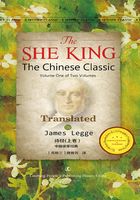
SËAOU SING
1 Small are those starlets,
Three or five of them in the east
Swiftly by night we go;
In the early dawn we are with the prince.
Our lot is not like hers.

Ode 9. Narrative. ANXIETY OF A YOUNG LADY TO GET MARRIED. It is difficult for a foreigner to make anything more out of the piece. The critics,however, all contend that it is not the desire merely to be married which is here expressed, but to be married in accordance with propriety, and before the proper time was gone by. They mix up two things:—the age when people should be married, males before 30, and females before 20; and the season of the year, most proper for marriages,—the season of spring. We can see an allusion to the latter, in the stanzas, but none to the former.
L. 1, 摽=落, 'to fall'. It is difficult to construe the有,which has no more force than the 其 in the last ode.See under 有 in the 3d index to the Shoo, where this peculiarity of the usage of 有 is pointed out. None of the critics say a word about it here. The mei is the general name for the plum tree; here a species, whose fruit is rather small and sour, and which ripens earlier than the peach. The falling of the plums makes the lady think of her own ripeness, and that it was time she should be plucked and married.
L. 2. Are we to understand 七 and 三 of 7 plums and 3 plums left on the tree, or as in the translation? Maou,Choo, and the commentators generally understand the single plums; Ying-tah adopts the proportional view(十分之中, 尚在樹者七). I agree with him because of the last stanza, for what need would there be of a basket to gather 3 plums?
L1.3.4 The freedom of the lady's expressions in these lines have been a stumbling-block to many.Ying-tah says, 'We are not to understand that the lady is speaking in her own person (非女自我), but that the poet personates any marriageable young person.' Hwang Chin (黃震; end of the Sung dyn.) hears in the words the language of a go-between, expressing the desire of the parents. But the 我 cannot be thus explained away. 迨及,—'till'. It is here=our 'while'. As Choo expands the line, 其必有及此吉日而來, 'they must come up to (=while it is now) this fortunate time'.
In st. 3, 頃筐,—see i. III. 塈 (al.概)=取, 'to take','gather'. 迨其謂之—'if they would but come to the speaking about it'; as Lacharme has it, 'diem dicat ille'. The lady is prepared to dispense with all previous formalities (但相告語而約可定).
The rhymes are—in st. 1, 七, 吉, cat. 12, t. 3; in 2, 三*, 今, cat. 7, t.1: in 3, 塈, 謂, cat.15, t.3.
Ode 10. Allusive. THE THANKFUL SUBMISSION TO THEIR LOT OF THE INFERIOR MUMBERS OF A HAREM. We must suppose that we have here the description by one of by one of the concubines of the lot of herself and her companions. It is the early dawn, and she is returning from her visit to the prince's chamber, which had been allowed her by his wife.

2 Small are those starlets,
And there are Orion and the Pleiades.
Swiftly by night we go,
Carrying our coverlets and sheets.
Our lot is not as hers.


